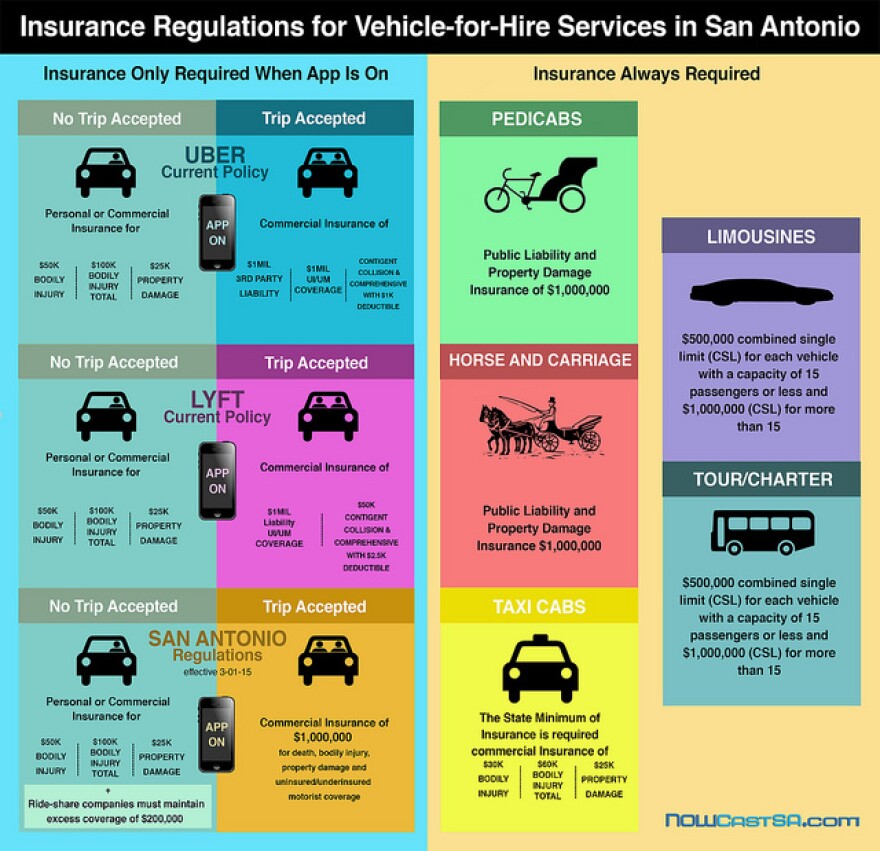
A San Antonio councilman says that the city is in talks with app-based transportation services, Uber and Lyft,in the hope of keeping them in the city. The March 1 date by which both ‘ridesharing’ companies would have to comply with new regulations is fast approaching. But as things stand, both companies have threatened to hit the road and pull out of the Alamo City. It’s a complex story.
Until last year, Joel Benavente had a job delivering packages. His wife Laura worked for Toyota but was laid off. They then heard about Uber and both decided to become full-time drivers for the service you can book through your smart phone app.
Now the Benaventes say that, together, they earn anywhere between $6,000 to $8,000 a month. So when they hear Uber may be leaving San Antonio because of new city regulations they figure they might leave too. “We go where the company goes,” says Joel Benevente. “Even though we’ve lived here all our lives, we were born here, we’ll go to Austin. We don’t mind leaving San Antonio. Why be in a city that doesn’t support ride sharing?” his wife continues.
Uber says there are thousands of drivers working for the company in the Alamo City. Then there’s also Lyft, which is another TNC. That stands for Transportation Network Companies. Unlike taxis, which have a centralized dispatching network, TNCs are organized through smartphone apps, which customers use to summon their rides. Drivers use their own personal vehicles.
Because of that the city is asking Uber and its drivers to provide a level of insurance coverage that Uber’s San Antonio’s General Manager, Henry Carr, calls unfair. “TNC’s are being required to pay five times as much insurance as taxis when a taxi could have four passengers in the vehicle and the TNC has zero,” says Carr.
Carr says Uber already carries a $1 million insurance policy on each driver for the time there’s a passenger in the car. The city also wants ridesharing companies to carry an additional $200,000 policy to covers drivers when their apps are turned on, but they’re just waiting for fares. Uber’s point is that’s far more coverage than taxicabs are required to have.
But John Bouloubasis, president of Yellowcab San Antonio, says the city isn’t giving cabbies special treatment. In fact, he says, it’s just the opposite. He says they pay higher registration fees and the city limits the number of cab drivers on the streets. There’s no limit, he says, on the number of Uber and Lyft drivers looking for passengers.
“We have a fixed number of permits. They have an unlimited number of permits. They can do whatever they want; they have a legal framework to print money. They don’t have to be ADA compliant,” says Bouloubasis.
Taxis also charge a mandated fixed rate at the start of each trip and a per mile fee, while Uber and Lyft are allowed to set their own rates.

District Two City Councilman Allen Warrick believes the city and Uber can find middle ground. That though, is when the ridesharing ordinance is supposed to go into effect, and when Uber says it will pull out of the Alamo city.
“We are in discussions with Uber and Lyft in order to potentially make adjustments to the current ordinance in order to allow them to work and flourish in San Antonio … as long discussions are in place, both organizations have said they will not leave San Antonio,” Warrick says.
Uber counters that that’s not the agreement they’ve made.
While the drama between the city and the companies continue, Joel and Laura Benavente are preparing to pack their bags. They say the money they make as Uber drivers is just too good to give up.




